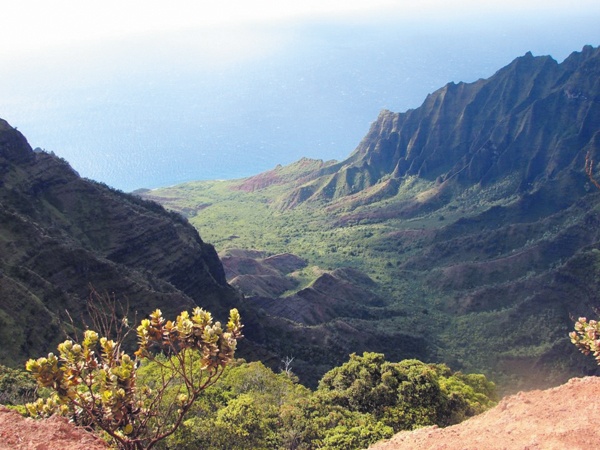LIHUE — Rep. Dee Morikawa has changed her mind about a bill aimed at the demise of the Kokee State Park Advisory Council.
“We worked it out,” she said. “It was a good conversation even if I got smashed.”
Legislators in the Hawaii House, including Morikawa, D-Koloa-Niihau, introduced a bill Jan. 21 aimed at doing away with the council. Lawmakers argued the nine-member council failed to do its job and cost the state money.
“Although the advisory council has been in existence for over four years, it is unclear what, if anything, the advisory council has actually accomplished with regard to revising or implementing the Kokee state park master plan,” House Bill 1824 states. “The state has lost potentially $300,000 in annual revenues from user fees because the master plan has not been adopted and implemented.”
After hearing testimony on Monday, however, Morikawa requested the bill be deferred.
Members of the advisory council, as well as the general public, described the bill’s language as false and offensive.
Five-year KSPAC member Erik Coopersmith said the council has worked tirelessly, voluntarily and with no state funding or support over the years to move the plan away from over-commercialization and toward preservation.
“They see the state parks as revenue generators and the community sees them as resources to be protected,” he said. “The advisory council has been very effective at reducing and removing plans that were unsatisfactory to the public.”
Those plans have included a 40- to 60-room hotel and restaurant at the Kanaloahululu meadow, widening the road to Kalalau lookout to accommodate full-size buses, new overlooks above Waimea Valley, a souvenir store at Waimea Canyon Lookout and several expanded parking areas.
While the plan today hardly resembles its original, it still contains controversial proposals, including an entry station to collect non-resident fees — which the council continues to stand firmly against.
Although he found the bill’s language insulting, Coopersmith said he “read between the lines” and feels it is really a compliment to the KSPAC’s successful work. If the council hadn’t been effective, Coopersmith believes the state wouldn’t be trying to do away with it.
“Apparently we’re doing what we’re supposed to be doing, and they don’t like that we’re sticking to our guns, refusing to play ball by their rules,” he said. “We’re a big failure in the state’s eyes, which means we’re a big success in the community’s eyes.”
A total of 24 pieces of testimony were submitted in opposition to the bill, while DLNR Chair William Aila submitted the lone piece in support.
“The extended planning process has not resulted in achieving a final Master Plan and EIS to present to the Board of Land and Natural Resources (BLNR) and has delayed needed park improvements,” he wrote.
Aila added that the $300,000 figure represents the annual amount lost from potential entry fees from commercial tour buses and out-of-state visitors.
In his testimony, KSPAC member Chipper Wichman called the bill’s language false and misleading.
“To abolish the Council now, after all the years of hard work and all that we have accomplished seems short-sighted and will be perceived by the larger community as (the) state once again wanting to ignore the voice of the people in the planning process,” he wrote. “There is a lot to lose and nothing to gain by approving this bill.”
Wichman also weighed in on the bill’s statement about lost revenues, calling it “completely false.”
The real reason that DLNR has not implemented the entry-fee system at Kokee is not because of the council not adopting the master plan, but because the road belongs to the Department of Transportation and will have to be transferred to DLNR.
The proposed preferred location for an entry station is in the vicinity of mile marker 6.9, north of the junction of Waimea Canyon Drive and Kokee Road. Another location, at the Kokee State Park boundary, is also being considered.
On Monday, the House Committee on Water and Land deferred decision-making on the bill until Friday, when Morikawa expects it will be deferred for good.
“This bill has finally brought out information about what this Council has been doing and is currently doing,” Morikawa wrote in an email.
Rep. Derek Kawakami, D-Wailua-Haena, a member of the Water and Land Committee, said Monday’s hearing shined light on the many challenges faced by the KSPAC.
“From my perspective, they did do a lot of hard work,” he said of the council. “They provide a venue for the community to have a voice about the place and future of Kokee, a place that we all love.”
Among those who submitted testimony against the bill were Kauai County Council members Gary Hooser, who helped initiate the KSPAC while in the Senate, and Mel Rapozo.
“Kauai needs this Advisory Council to ensure the protection and preservation of Kokee State Park,” Rapozo wrote. “Kokee is special to Kauai’s people.”
The Division of State Parks is expected to send a final version of the master plan to KSPAC later this month. The council has scheduled a meeting for March 29 to review and approve the plan and send it to the BLNR, according to Wichman’s testimony.
• Chris D’Angelo, environmental reporter, can be reached at 245-0441 or cdangelo@thegardenisland.com.





